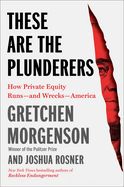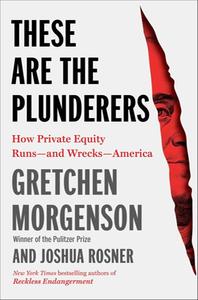
 Those who don't closely follow the world of business and investing may be, at best, only dimly aware of the phenomenon known as private equity. By the time readers have finished Pulitzer Prize-winning investigative reporter Gretchen Morgenson and banking and financial consultant Joshua Rosner's thorough, unsparing These Are the Plunderers: How Private Equity Runs--and Wrecks--America, their eyes will be opened wide to the machinations of this small group of "modern-age robber barons" whose relentless practice of a "rapacious form of capitalism" allows them to amass unimaginable wealth at enormous cost to American businesses, workers, and taxpayers.
Those who don't closely follow the world of business and investing may be, at best, only dimly aware of the phenomenon known as private equity. By the time readers have finished Pulitzer Prize-winning investigative reporter Gretchen Morgenson and banking and financial consultant Joshua Rosner's thorough, unsparing These Are the Plunderers: How Private Equity Runs--and Wrecks--America, their eyes will be opened wide to the machinations of this small group of "modern-age robber barons" whose relentless practice of a "rapacious form of capitalism" allows them to amass unimaginable wealth at enormous cost to American businesses, workers, and taxpayers.
In their disturbing story, Morgenson and Rosner (Reckless Endangerment) devote considerable attention to the activities of Leon Black and his investment firm Apollo Global Management. Apollo rose out of the ashes of Drexel Burnham Lambert, a Wall Street company that became notorious in the 1980s for peddling so-called junk bonds to finance corporate buyouts, and that collapsed amid charges of criminal fraud. Executive Life Insurance Company had been a Drexel client, and in a painstaking account, the authors describe how Black took advantage of that connection to engineer, with the aid of California's insurance commissioner, a takeover of the troubled insurer. The result? Massive profits to Black (whose net worth was estimated at $7 billion in 2018) and Apollo, and disastrous losses of some $3 billion to Executive Life's policyholders.
These Are the Plunderers presents many more of these troubling case studies, like that of the well-known luggage manufacturer Samsonite, acquired first by the private equity firm Kohlberg Kravis Roberts (KKR) and later Apollo, resulting in "the degradation of the venerable company, the extraction of cash, the layoffs, the losses, the brush with bankruptcy, the cratered stock." Another victim was Noranda Aluminum, a smelting business located in a small Missouri community. Apollo's acquisition produced a financial windfall for Black and his cohorts and eventual bankruptcy for the company, along with higher consumer electric bills and drastic cuts in the local school district budget when tax revenues from the closed plant disappeared.
Morgenson and Rosner don't focus exclusively on these discrete stories. They reveal, for example, that KKR and its private equity rival the Blackstone Group control one-third of the emergency rooms in American hospitals, and that private equity firms own 11% of the country's nursing homes, where cost-cutting and inflated billing too often have become the norm. And as they explain, the ability of Black and his private equity colleagues to rely on a loophole in the U.S. tax code that allows their earnings to be taxed at a rate lower than normal wage earners only serves to enrich them further.
Men like Leon Black don't build or create anything. As Gretchen Morgenson and Joshua Rosner so lucidly explain, these "modern privateers" simply act as dealers reshuffling marked cards in the deck of American capitalism. In the high stakes game they're playing, it's a deck that's stacked against the rest of us. --Harvey Freedenberg, freelance reviewer
Shelf Talker: In this exposé, Gretchen Morgenson and Joshua Rosner reveal how private equity firms reap massive profits at the expense of most other actors in the American economy.

